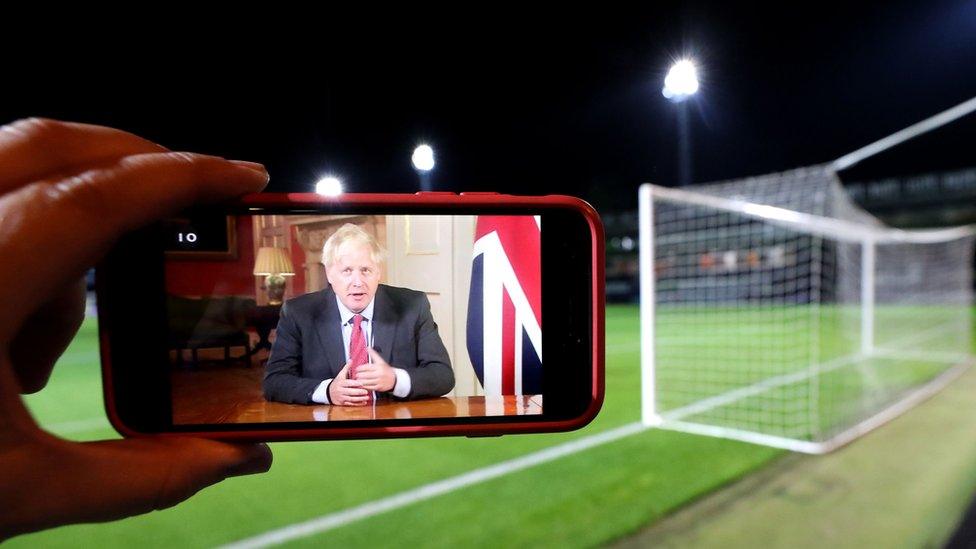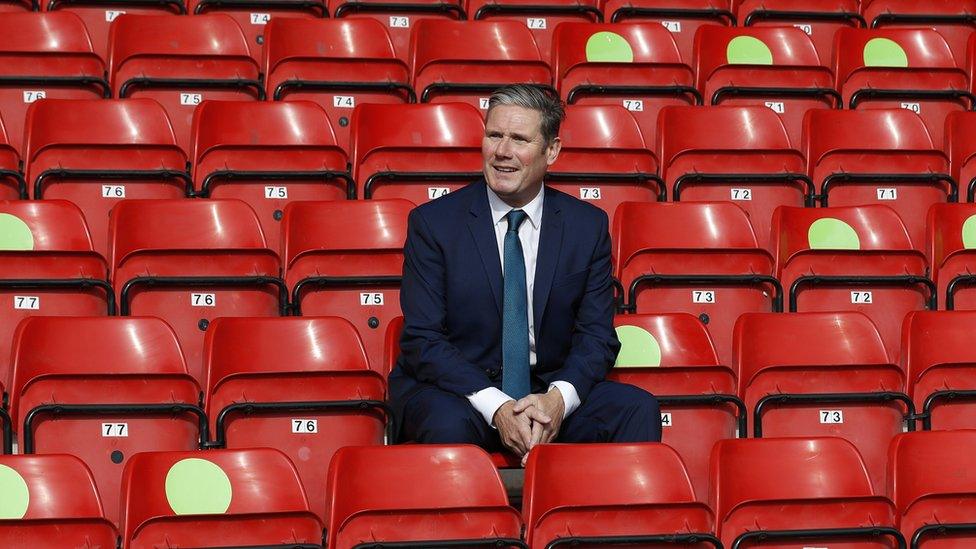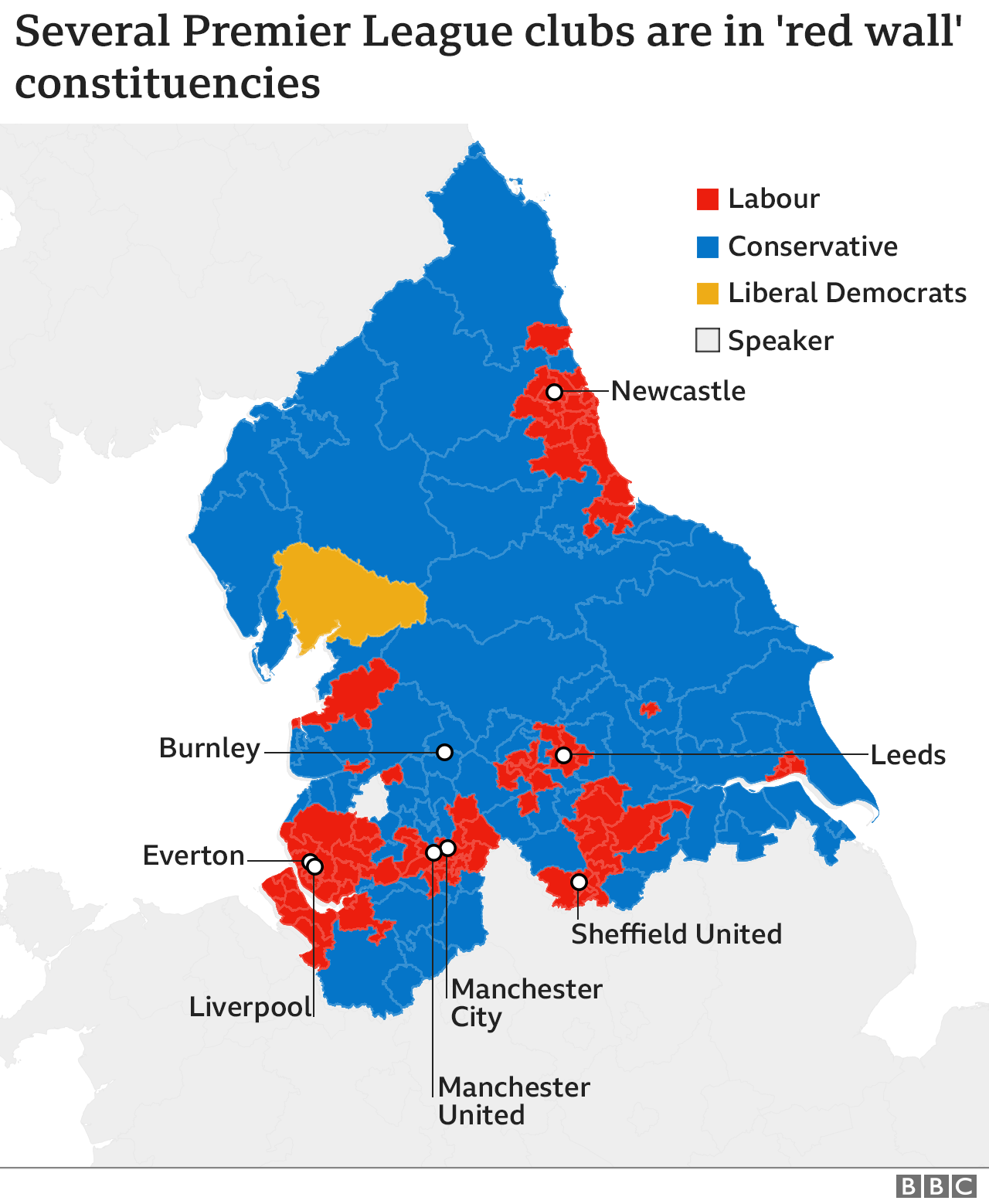European Super League: Why Johnson and Starmer dived into the row
- Published

Boris Johnson did not waste a moment wading into the row over the European Super League - vowing to do everything in his power to stop it.
Within hours of the announcement from the clubs involved, he had tweeted his condemnation, external.
And all this from a prime minister who isn't even a football fan himself.
So why did he want to get stuck in?
He was still at it during Prime Minister's Questions, even dipping into the book of football cliches to declare the decision to ditch the ESL the "right result".
As the mayor of London during the 2012 London Olympics, Mr Johnson discovered first hand the power of sport to unite people and lift the national mood, as well as boosting his own popularity.
But there are other, deeper factors at play.
Firstly, let's think about some of the big concepts that have driven British politics in recent years: Belonging, identity and pride.
And yes, that famous slogan of five years ago from the Vote Leave campaign - a desire to "take back control."
The European Super League felt like a laser guided strike on these amorphous but powerful feelings.
Red Wall seats
"It is pretty much the first thing I thought," the pollster Deborah Mattinson told me.
Mattinson wrote a book, Beyond The Red Wall, about those swathes of seats in the Midlands and north of England that voted Conservative for the first time at the last general election.
"It is about 'my place, my community'. It is a sense of what is yours, versus globalism."
Look at the ESL through this lens and we see a group of powerful global brands cooking up what critics see as a self-serving, money-spinning scheme, without even asking the people upon which their empires were built - the supporters - what they make of it.
But why shouldn't these companies seek to maximise their assets?
What about the Conservative instinct for the free market?
Downing Street argued that this was different.
"The clubs aren't just global brands, they originate from local communities," No 10 said. "This is not just a pure business decision. It is important for the fans and for their local communities."

Sir Keir Starmer on a visit to Walsall football club
Sir Keir Starmer was just as outspoken as the prime minister in his condemnation of the ESL, and just as quick to welcome its demise.
"Even as an Arsenal season ticket holder," said the Labour leader, with a reference to one of the six English clubs who wanted to be part of the ESL, he felt the move would have "destroyed football".
'Local roots'
Starmer and Johnson both appear to understand how politics is changing in the aftermath of Brexit.
"The big message in politics of the last 10 years - with Brexit and the realignment of party support - is people want power and influence sent down towards them, not up and away from them.
"Football, which has local roots, is drifting away from people, when the currents in politics are going in the opposite direction," says Matthew Goodwin, Professor of Politics at the University of Kent.
And then there is geography to consider.
"There is a new political geography in Britain. In the vast majority of the constituencies the Conservatives won from Labour at the last election, there are loads of people who feel passionately about this," says Matthew Goodwin.

In other words, in England's political battleground, towns, this issue has disproportionate resonance.
As Paul Waugh, of HuffPost, has reflected, external many of these towns, such as Burnley, Blackpool, Lincoln and Crewe, are Leave-voting and home to smaller clubs whose supporter base is much more geographically concentrated.
These are places where identity, belonging and taking back control matters - and whose football teams aspire to climb the league pyramid, their success the only determinant of how high they might get.
'Belongs to you'
They are also places enthused by Brexit and, arguably, drawn to a promise to "level up", to use the government's jargon for spreading wealth and power to previously neglected areas.
Matthew Goodwin, who wrote a well-regarded book on the rise of UKIP, says: "This is a crucial cultural point as well. The British sense of fair play. An aspiration to rise up the social and economic ladder. This league violates that. It says we are just cementing the elite."
And, as Prospect magazine has previously pondered, external, there is another, more nuanced, geographical point worth reflecting on too.
The footballing elite, the Premier League, is overwhelmingly based in Labour-voting, urban, Remain leaning seats.
And not a single top flight side has the word "town" in its title, even if a few sides are based in towns.
Yes, this stuff can be overdone, and it appears the vast majority of fans of the six English clubs that were involved in the Super League were as appalled by it as many other football fans.
But it underlines how geography matters.
So the European Super League managed to unite the usual squabbling political tribes, who only competed in how strong their condemnation of the idea was.
"This is about something that you feel belongs to you, being taken away from you," Deborah Mattinson reflects.
In that sense, this was always a row about much more than football.
It also tells us about some of the forces reshaping our political landscape, and the way in which our political leaders are being forced to adapt.